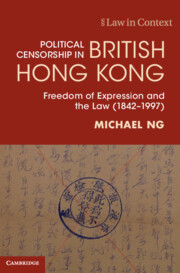‘Michael Ng offers an outstanding account of political censorship in colonial Hong Kong. Drawing on rich archival research, Ng argues the chimera of the rule of law in Hong Kong, and subsequent legal reforms, were largely shaped by dynamic geopolitics, particularly as between the UK and China. A terrific book.’
Pip Nicholson - William Hearn Professor of Law and Deputy Vice-Chancellor (People and Community), Melbourne Law School
‘This is a penetrating and lucid account of how British colonial authorities suppressed political speech and activism during their 155-year reign over the city. The more liberal and rule of law oriented regime they left behind in 1997 was, as Ng expertly demonstrates, largely a legacy of the final two decades of British rule, produced under the looming specter of Chinese reacquisition. Prior to that, British authorities were consistently hostile to local demands for more political autonomy and freedom, suppressing them through a wide range of legal and administrative tools. This book forces us to confront this darker history and rethink common assumptions about the nature of British colonialism in Asia.’
Taisu Zhang - Professor of Law, Yale Law School and author of The Ideological Foundations of Qing Taxation (2022)
‘Michael Ng upends narratives of Hong Kong’s rule-of-law past and its colonial nostalgia. Through his careful archival study, Ng shows that censorship and libel laws were long the tools of British colonizers in Hong Kong. By explaining Hong Kong's status as a fulcrum of British-Chinese relations, Ng situates the story of Hong Kong in the broader fields of comparative legal history, international relations, and geopolitics, telling a story that resonates powerfully for students of empire.’
Matthew Erie - Associate Professor of Modern Chinese Studies, University of Oxford and author of China and Islam (2016)
‘In his fascinating study of free expression in colonial-era Hong Kong, Michael Ng shows how this worked on the ground. Today, some argue that the British legacy in Hong Kong was one of democratization and freedom of expression, in contrast to the censorship and repression of the current regime. Ng shows a very different historical reality. Freedom of expression was only prioritized by the colonial state as the handover to China became imminent. Press freedom had but shallow roots in the colony, and frequently the British colonial state sought to harass and prosecute those who criticized it in the public sphere. Today’s activists who imagine a lost era of colonial freedom are, Ng rightly argues, indulging in nostalgic fantasies of a former golden age.’
Simon Potter - Professor of Modern History, Department of History, University of Bristol
‘… fascinating … [This] study should be of interest to scholars of the history and politics of Hong Kong, to those working on British imperial history, and to all those interested in histories of press freedom and freedom of expression.’
Simon J. Potter
Source: The China Quarterly
‘Carefully researched and well argued, this book addresses and provokes important questions of the nature of colonial rule, and how far notion of the rule of law could be marginalized in a colonial context. It will be of great interest not only to historians of Hong Kong, but also to those interested in the nature of colonial rule throughout the British Empire.’
Michael Lobban - University of Oxford
‘Ng’s comprehensive and thought-provoking book makes a major contribution to Hong Kong’s legal history and colonial history. By drawing on a wide range of archival sources, he enables readers to understand the true nature of British colonialism in Hong Kong through the lens of political censorship rather than ‘read history backwards’ out of post-2019 nostalgic feelings about the colonial past.’
Chi-kwan Mark - University of London
‘For anyone interested in the history of British colonial approaches to freedom of expression in particular, and civil rights in general, the book is invaluable, tracing as it does a century and a half of developments in the laws and institutions utilised to suppress oppositional or critical sentiment.’
Christopher Roberts - Chinese University of Hong Kong





